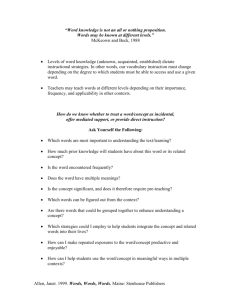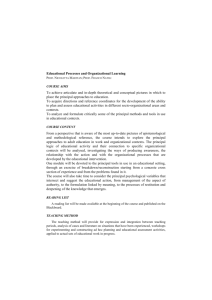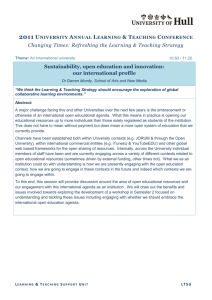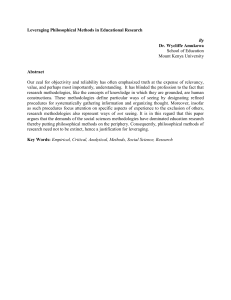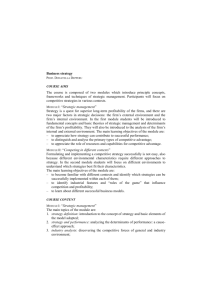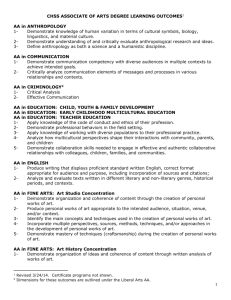Thinking Processes: Reasoning, processing and - Hench
advertisement
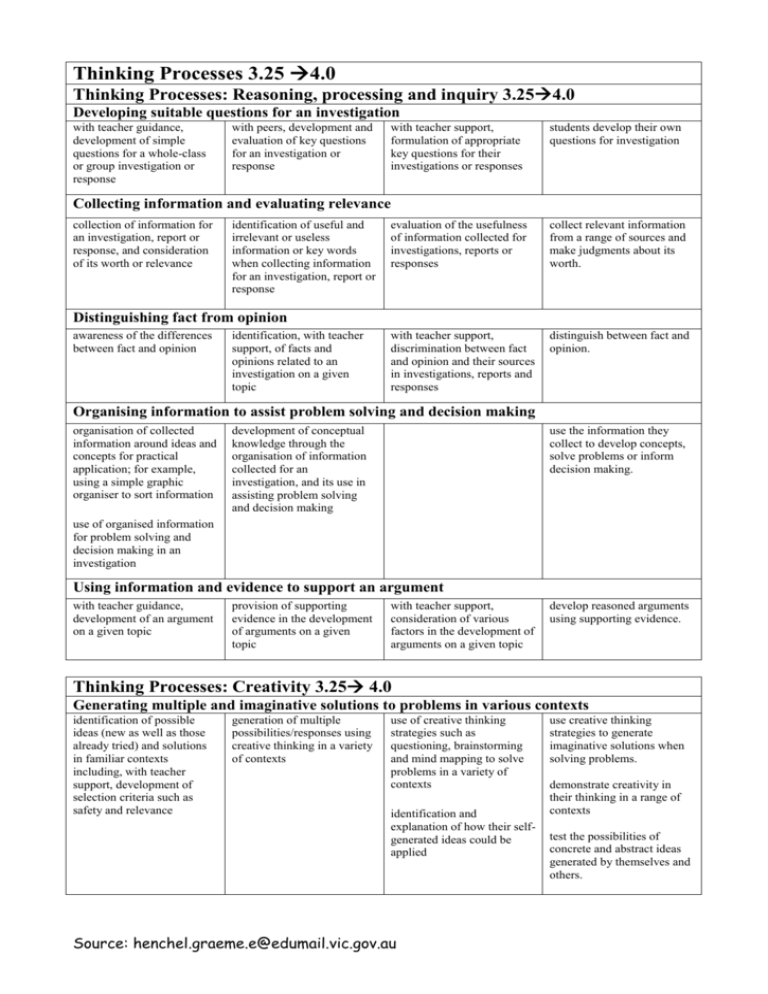
Thinking Processes 3.25 4.0 Thinking Processes: Reasoning, processing and inquiry 3.254.0 Developing suitable questions for an investigation with teacher guidance, development of simple questions for a whole-class or group investigation or response with peers, development and evaluation of key questions for an investigation or response with teacher support, formulation of appropriate key questions for their investigations or responses students develop their own questions for investigation Collecting information and evaluating relevance collection of information for an investigation, report or response, and consideration of its worth or relevance identification of useful and irrelevant or useless information or key words when collecting information for an investigation, report or response evaluation of the usefulness of information collected for investigations, reports or responses collect relevant information from a range of sources and make judgments about its worth. with teacher support, discrimination between fact and opinion and their sources in investigations, reports and responses distinguish between fact and opinion. Distinguishing fact from opinion awareness of the differences between fact and opinion identification, with teacher support, of facts and opinions related to an investigation on a given topic Organising information to assist problem solving and decision making organisation of collected information around ideas and concepts for practical application; for example, using a simple graphic organiser to sort information development of conceptual knowledge through the organisation of information collected for an investigation, and its use in assisting problem solving and decision making use the information they collect to develop concepts, solve problems or inform decision making. use of organised information for problem solving and decision making in an investigation Using information and evidence to support an argument with teacher guidance, development of an argument on a given topic provision of supporting evidence in the development of arguments on a given topic with teacher support, consideration of various factors in the development of arguments on a given topic develop reasoned arguments using supporting evidence. Thinking Processes: Creativity 3.25 4.0 Generating multiple and imaginative solutions to problems in various contexts identification of possible ideas (new as well as those already tried) and solutions in familiar contexts including, with teacher support, development of selection criteria such as safety and relevance generation of multiple possibilities/responses using creative thinking in a variety of contexts use of creative thinking strategies such as questioning, brainstorming and mind mapping to solve problems in a variety of contexts identification and explanation of how their selfgenerated ideas could be applied Source: henchel.graeme.e@edumail.vic.gov.au use creative thinking strategies to generate imaginative solutions when solving problems. demonstrate creativity in their thinking in a range of contexts test the possibilities of concrete and abstract ideas generated by themselves and others. Thinking Processes: Reflection, evaluation and metacognition 3.25 4.0 Evaluation of their own thinking processes and tools with teacher guidance, reflection on the effectiveness of a range of thinking processes and tools in particular contexts with teacher prompting and support, evaluation of the effectiveness of their thinking processes and tools independent reflection on, and evaluation of, the effectiveness of their thinking processes and tools use a broad range of thinking processes and tools, and reflect on and evaluate their effectiveness. use of appropriate terminology and provision of suitable examples when articulating their thinking processes articulate their thinking processes. Articulating their own thinking processes awareness of how their ideas and understandings have changed, and use of examples in simple explanations use of appropriate terminology when articulating their thinking processes Recording how their thinking and thinking strategies change over time systematic recording of changes in their thinking and understandings identification and documentation of how and why their ideas, understandings and beliefs have changed over time Source: henchel.graeme.e@edumail.vic.gov.au document changes in their ideas and beliefs over time. Thinking Processes 4.25 5.0 Thinking Processes: Reasoning, Processing and Inquiry 4.255.0 Forming questions, locating information, evaluating information with teacher direction and using a range of strategies and self-formulated questions, identification of information that would be appropriate for an investigation, analysis or report. identification and synthesis of relevant information from given sources, using appropriate strategies to evaluate evidence; for example, identifying subjective or misleading information use of self-generated selection criteria to locate and critically assess information from varied sources for investigative purposes use a range of question types, and locate and select relevant information from varied sources when undertaking investigations. Using specific strategies and methodologies in curriculum context with teacher direction and peer support, application of a range of methodologies; for example, in an investigation, analysis or report application of teacherselected methodologies in a curriculum context application of a range of appropriate strategies when reasoning independent use of a methodology in a curriculum context When identifying and synthesising relevant information, they use a range of appropriate strategies of reasoning and analysis to evaluate evidence and consider their own and others’ points of view. Problem solving and Decision making problem solving and decision making in activities which involve a few variables completion of activities focusing on problem solving and decision making which involve a few variables completion of activities focusing on problem solving and decision making which involve variables and other possible solutions use a range of disciplinebased methodologies. They complete activities focusing on problem solving and decision making which involve an increasing number of variables and solutions. Thinking Processes: Creativity 4.25 5.0 Exploring possibilities and generating multiple options and solutions with teacher guidance, use of a range of creative thinking strategies for exploring possibilities and responding appropriately to a challenge with teacher guidance, generation of multiple options and solutions or responses to problems or issues; for example, by adapting and adding ideas with teacher support, application of creative thinking strategies for a variety of purposes and problems, and in a range of contexts apply creative thinking strategies to explore possibilities and generate multiple options, problem definitions and solutions. demonstrate creativity, in the ways they engage with and explore ideas in a range of contexts. Thinking Processes: Reflection, Evaluation and Meta-cognition 4.25 5.0 Awareness and use of a range of thinking tools awareness of the purpose of thinking tools in different applications such as brainstorming and analysis identification of a range of thinking tools and their intended purposes in different applications appropriate use, in a variety of contexts, of a range of thinking tools and strategies explain the purpose of a range of thinking tools and use them in appropriate contexts. Reflection, evaluation and articulation of thinking processes teacher-prompted articulation of their thinking processes during investigations teacher-supported reflection on their thinking processes; for example, in problem solving or research description of and reflection on their thinking and their thinking processes in different contexts teacher-directed evaluation of their thinking strategies with guidance, evaluation of their thinking strategies; for example, using a reflection sheet or discussion with peers evaluation and justified modification of their thinking strategies during investigations Source: henchel.graeme.e@edumail.vic.gov.au use specific language to describe their thinking and reflect on their thinking processes during their investigations. modify and evaluate their thinking strategies. describe and explain changes that may occur in their ideas and beliefs over time. Thinking Processes 5.25 6.0 Thinking Processes: Reasoning, Processing and Inquiry 5.256.0 Generating questions, selecting and applying information from a variety of sources generation of appropriate questions for exploring and analysing differing perspectives on an issue using teacher-provided structures, application of information from a variety of sources in different forms selection of information from a variety of sources; for example, modifying research questions, connecting information to form new ideas independent application of information from a variety of sources and in different forms generate questions that explore perspectives. students discriminate in the way they use a variety of sources. Use information processing tools and skills to analyse information and data use of informationprocessing skills in problemsolving activities that involve many variables; for example, interpreting data to draw out valid conclusions use of informationprocessing skills in problemsolving activities that involve many variables and possible solutions; for example, analysing data to draw out valid conclusions and/or make predictions process and synthesise complex information and complete activities focusing on problem solving and decision making which involve a wide range and complexity of variables and solutions. Use appropriate methodologies for creating and verifying knowledge and making decisions with teacher support, employment of appropriate methodologies for checking knowledge; for example using surveys, data searches and primary and secondary sources use, in various curriculum contexts, of appropriate methodologies for verifying knowledge; for example, application of scientific methodology use of appropriate methodologies for verifying and creating knowledge across the curriculum synthesis of information when considering various perspectives processing and synthesis of complex information in problem-solving tasks, and consideration of various perspectives/positions and variables in making decisions employ appropriate methodologies for creating and verifying knowledge in different disciplines. make informed decisions based on their analysis of various perspectives and, sometimes contradictory, information. Thinking Processes: Creativity 5.25 6.0 Using thinking strategies to explore possibilities and engage with complex ideas willingness to take risks with innovative possibilities when undertaking set tasks use of a variety of creative thinking strategies, such as mind mapping, analogy and questioning of assumptions, to deepen understanding use of a range of selfselected creative thinking strategies when engaging with complex and novel ideas use of creative thinking strategies to address ambiguity and contentiousness in their own and others’ ideas Source: henchel.graeme.e@edumail.vic.gov.au experiment with innovative possibilities within the parameters of a task. take calculated risks when defining tasks and generating solutions. apply selectively a range of creative thinking strategies to broaden their knowledge and engage with contentious, ambiguous, novel and complex ideas. Thinking Processes: Reflection, Evaluation and Meta-cognition 5.25 6.0 Understanding, evaluating and articulating their own thinking process consideration of their thinking processes and tool selection, and of any changes in their thinking, when reviewing information justification of their thinking processes and tools, and analysis of changes in their thinking when reviewing information and their own ideas and beliefs discrimination in weighing up the relative advantages and disadvantages of particular thinking processes and tools for particular tasks awareness of the different methodologies used across the domains to create and verify knowledge use specific terms to discuss their thinking, select and use thinking processes and tools appropriate to particular tasks, and evaluate their effectiveness. explain the different methodologies used by different disciplines to create and verify knowledge Analysis of their own and alternative viewpoints and changes that may occur overtime analysis of similar and alternative viewpoints on information or an issue understanding of their own and others’ viewpoints following analysis of those perspectives understanding of conscious changes that have occurred in their own and/or others’ thinking, and of their own and alternative viewpoints and perceptions Source: henchel.graeme.e@edumail.vic.gov.au when reviewing information and refining ideas and beliefs, students explain conscious changes that may occur in their own and others’ thinking and analyse alternative perspectives and perceptions.
